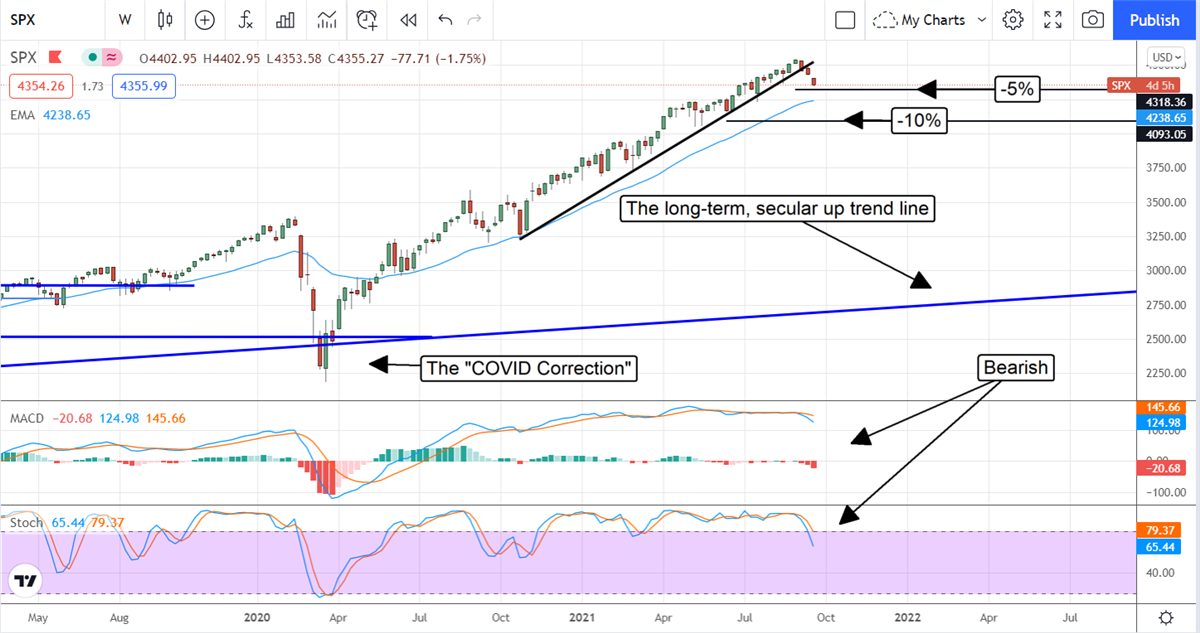How Deep Can This Stock Market Correction Go? The S&P 500 are on the brink of an earnings reset that could shave as much as 35% off of the index price, but we welcome the move as the next great en...
This story originally appeared on MarketBeat

The Stock Market Sell-Off Gains Momentum
If you are asking the question, how deep can this stock market correction go, the real simple answer is all the way to the bottom. It is incredibly unlikely that the correction will take the S&P 500 (NYSEARCA: SPY) to a valuation of $0 but it is highly likely will see a technical correction that could go as deep as 20% or 25% from the last all-time high. More if the market corrects all the way back to what was a very significant, secular grade uptrend line. Our point? There are a growing number of factors weighing on the market that ultimately can and will lead to a reset of valuation for the S&P500.
The Biggest Risk For The S&P 500
The biggest headline in the news right now is the impending default of Evergrande but that is only one brick in the wall of worry confronting the market today. Evergrande is a Chinese real estate developer with over $300 billion in debt that it may soon default on. That is an absolute risk for China and could possibly cause a domino effect by spilling over into other economies.
Underlying everything else is interest rate risk from the Fed. The FOMC is hosting its September policy meeting and is expected to deliver a hawkish surprise to the market. The Fed is not expected to alter its policy but the trend in data supports the idea that tapering should start soon if not already be underway.
And inflation is a big risk for the market in more ways than one because inflation is underpinning the earnings growth outlook. The S&P 500 are producing organic growth but they're also producing top and bottom-line growth that is the direct result of price increases meant to battle inflation. At the moment, the balance of companies has been able to offset the pace of their own rising costs and widen their margins but that could change very soon. Regardless, no few companies have reported significant impacts to their bottom-line results from higher input costs, wages, and freight.
It's Also About The Supply Chain
The root cause of inflation, the root causes, are many but include Fuel and Freight. Not only are fuel costs rising but there is a shortage of freight capacity throughout the system that has been persisting for years and not really showing signs of change. While the truckers and shipping companies have been able to lure in some new workers the demand for capacity is outpacing that and it's costing them dearly. Not only are the shippers missing out on business but they are having to pay more wages and higher incentives and retention bonuses which is amplifying the already rising cost of shipping goods.
And then there is the supply chain angle of the freight issue. Not only is there a shortage of some vital supplies including and perhaps most notably semiconductors, but it's also hard for businesses to get what they need when they need it. This is impacting top-line revenues in the near term but leading to higher backlogs which should sustain activity longer-term.
The bottom line is that the S&P 500 has a lot of headwinds in terms of revenue growth and earnings growth. The market was already faced with a dramatic slowdown in year-over-year growth due to the overlapping of tough comps in last year's calendar third quarter. If the expectations and consensus estimates for third and fourth-quarter growth begin to recede the market could be in for a very hard landing indeed.
The Technical Outlook: The S&P 500 Will Fall At Least 5%
The S&P 500 have already exceeded -3% in this correction and look like it will easily reach -5% before hitting firm support. The recent price action has the index accelerating a move below the uptrend line and the short-term moving average which is now pointing lower. The indicators are bearish and convergent with the decline so we would expect to see price action at least retest today's low if not exceed it at some point in the future.
Price action may stabilize over the next day or two but, unless there is some much-needed good news, we see the sell-off continuing lower to at least the 4095 level. Longer-term, we expect to see the index move sideways and consolidate near the 4995 level before making its next big move. If the outlook for earnings continues to deteriorate, we could see the index complete a larger pattern and actually reverse course. In this scenario, the index could move down to the long-term secular uptrend line good for a decline of 36%.









